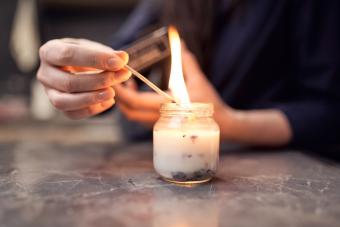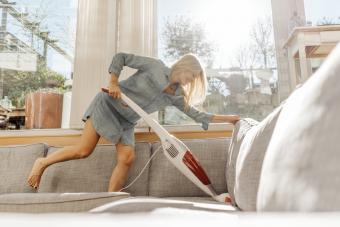
Making homemade window cleaner is an easy way to save money and protect the environment. It is simple to make from substances that are common to nearly every home and is a nontoxic solution to your cleaning needs.
Why Homemade Cleaner?
Many people have never even considered making their own glass and window cleaners. It is very convenient to run to the store and pick up a bottle of cleaner when necessary. It's not uncommon for people to believe if it isn't bright blue then it certainly can't clean a window properly.
Recently though, more and more consumers are concerned with the environmental impact of modern conveniences. From the plastic bottles that the cleaners come in to the fuel used to transport it, conventional glass cleaners have a carbon footprint the size of Alaska. The chemicals used are harsh and often dangerous for children, and ultimately pollute the water system.
Homemade cleaners, on the other hand, are made from natural ingredients, including:
- Rubbing alcohol
- Vinegar
- Cornstarch
- Hydrogen peroxide
- Lemon juice
- Natural soaps
- Essential oils
What About Ammonia?
Ammonia is a substance that is produced naturally in the environment. It is found in:
- Air
- Water
- Plants
- Animals
- Soil
It does not last long in the environment because it is absorbed as a nutrient by plants, bacteria, and animals. Because it is absorbed so quickly it does not build up to toxic levels. Therefore it is safe to use ammonia as directed. Never combine chlorine bleach and ammonia, vinegar, or any other acid because the fumes can be deadly.
Recipes for Vinegar Based Glass Cleaners
Vinegar makes a good homemade window cleaner. It removes oil and grease from glass and other surfaces. It also keeps windows from fogging up. Either distilled white or cider vinegars can be used in the following recipes:

Vinegar Cleaner One
- One cup vinegar
- Four cups water
Vinegar Cleaner Two
- One cup vinegar
- Four cups water
- Small squirt of organic dish soap
Vinegar and Lemon Cleaner
- One-half cup vinegar
- One-fourth cup lemon juice
- Four cups water
- One squirt organic dish soap
Recipes for Rubbing Alcohol Based Glass Cleaners
Rubbing alcohol makes a good glass cleaner because it evaporates quickly without streaking. It is inexpensive and can be used straight from the bottle or added to other substances. There are several recipes using rubbing alcohol as a base for glass cleaner such as:
Alcohol Based Glass Cleaner
- One-half cup rubbing alcohol
- One-eighth cup ammonia
- One teaspoon liquid organic dish soap
- One quart of water
Simple Alcohol Glass Cleaner
- One cup alcohol
- One cup water
- One tablespoon ammonia
Alcohol and Vinegar Cleaner
- One cup rubbing alcohol
- One cup water
- One tablespoon vinegar
Tips for Homemade Window Cleaner
Consider the following tips when using a homemade cleaner:
- Add a few drops of your favorite essential oil for a nice scent.
- You can clean windows with club soda and a soft flannel cloth.
- Adding a little baking soda will make windows shine.
- Straight vinegar will remove decals and sticky spots from windows and other glass.
- Hydrogen peroxide can be used in a ratio of four cups of water to one-half cup hydrogen peroxide. Not only does it clean but it disinfects glass and other surfaces.
- You can use newspapers to clean windows. They will buff them to a shine.
- Mark the spray bottles that you keep your homemade window cleaner in very clearly.
- Don't clean windows when the sun is shining directly on them.
Change Is Difficult
It can be hard to get into the habit of making your own cleaners. There are some differences in the homemade cleaners and you may need to try several recipes until you find one that works well for you. If you try a cleaner and end up with filmy or streaky windows try adding a little extra dish soap. Sometimes this small adjustment will make all the difference. Once you get used to using homemade cleaners you won't want to go back to anything else.







